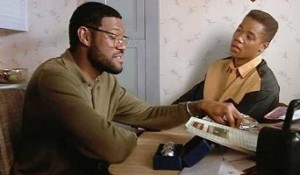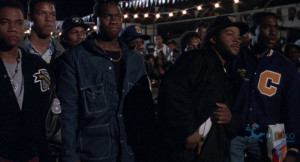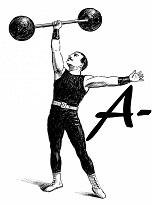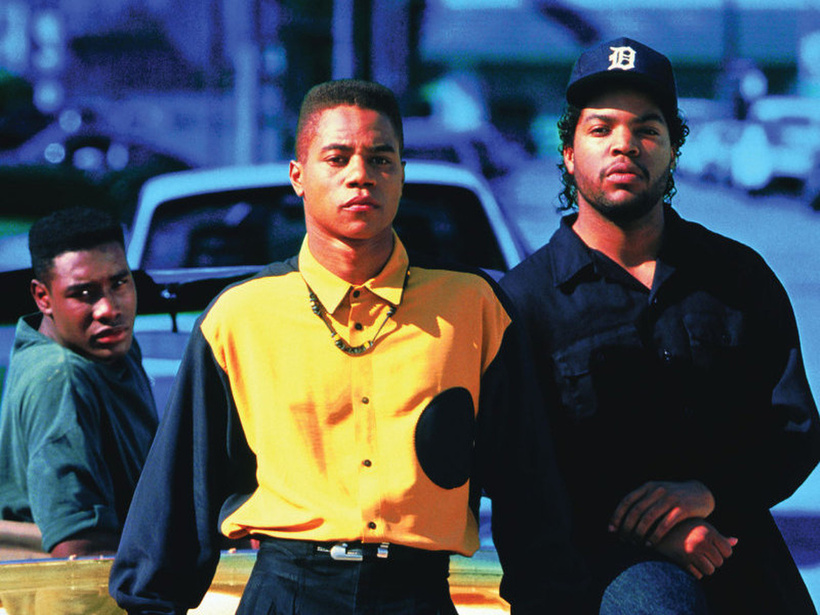“Boyz n the Hood” is a powerful and stark film. While it takes place in gang-filled Los Angeles, this is not a gang film, but a coming-of-age one. It features several actors who would go on to star in blockbusters, but is toned down and level-headed. This is a film, like 1993’s “A Bronx Tale,” that starts in its protagonist’s youth and follows him through his years as a young man. And while slow to start, it offers a powerful impact, especially towards its inevitable conclusion, that makes it authentic and captivating.
“Boyz n the Hood” follows Tre Stiles and his father (Laurence Fishburne) after Tre’s mother (Angela Bassett) drops him off to live with his dad. While he is smart, Tre has gotten into several altercations at school and she feels his father needs to show him “how to be a man.” Tre is played by 2 different actors, Desi Arnez Hines II at age 10, and Cuba Gooding Jr. as a young man. As he grows up, his intelligence and his dad’s passionate fathering keep him out of trouble. We see others who are not so lucky, such as one of his friends, “Doughboy,” played with sublime skill by rapper Ice Cube.
“Boyz” succeeds at the hands of its actors and the solid character development presented by Writer/Director John Singleton. We see L.A. from the streets, and we’re kept in the grips of his vision for most of the film’s run-time. As Tre grows up we see him bonding with his dad along the beach talking about sex, life, and other things. He sees his first glimpse of the criminal lifestyle when one of his friends is arrested for stealing. This is juxtaposed with his father, who lives a clean life, but still needs to defend his home one night from an intruder.

The scene is powerful, especially as we see the hate and disdain by the police for gang life. But it’s not from a white person that Tre hears his first racial slur aimed at a black, but from a black cop who shows up to investigate the robbery. “Yeah, there’s a problem,” his father retorts to the officer. “It’s just a shame you don’t know what it is.”
“Boyz n the Hood” is smart, and doesn’t cast others in the ‘hood in a negative light, even though they may be on dangerous and deadly paths. Doughboy and others drink beer during the day and hang out during the night, altercations and tough-guy banter often lining the proceedings. The film also highlights the frustration of the inner-city from both young and old alike.
One of the most powerful scenes shows Tre’s father, Furious, lecturing his son and a friend on neighborhood gentrification, which draws elderly members of the community as well as young. The old blame the young gangsters for this division, the young blame their lot in life. They both miss the point. Furious preaches for them to stick together, in an enclave, to be successful like Chinese and Italian immigrants. But there’s a lot stacked against them.
Performance-wise, the movie is excellent. Fishburne is in command of his character and carries his scenes easily. He’s fatherly, real, and down-to-earth. There’s simply no predictor of Morpheus here. He’s a believable father that cares for his son in a very pragmatic and loving way.

I was also impressed with both Cuba Gooding Jr. and Ice Cube throughout. The high-pitched antics that Gooding Jr. would later display in “Jerry MacGuire” are missing here, and we see an honest portrayal of a young man pulled in two directions. A scene where he vents his anger after being hassled by police to his girlfriend (Nia Long) is particularly powerful. Alongside this, Ice Cube delivers his lines well, is the quasi-leader of his group of friends, all while wearing the hat of the black sheep whom his mother has long given up on. Supporting actors add to the film in necessary ways, and there are really no missteps here.
The film uses a small focus to envelope us in, is funny in some places, touching in others, and poignant throughout. It also holds a scene – as a youth is shot by a gang – that is one of the most powerful and heartbreaking I’ve seen in quite some time. “Boyz n the Hood” stays with you after the credits, and makes its case for injustice and hardships without moralizing. All-in-all a great film and easy recommend.
– by Mark Ziobro


